- Home
- Louisa May Alcott
The Annotated Little Women Page 13
The Annotated Little Women Read online
Page 13
“Hush! don’t say anything,” she whispered; adding aloud, “It’s nothing; I turned my foot a little,—that’s all,” and limped up stairs to put her things on.
Hannah scolded, Meg cried, and Jo was at her wits’ end, till she decided to take things into her own hands. Slipping out, she ran down, and finding a servant, asked if he could get her a carriage. It happened to be a hired waiter, who knew nothing about the neighborhood; and Jo was looking round for help, when Laurie, who had heard what she said, came up and offered his grandfather’s carriage, which had just come for him, he said.
“It’s so early,—you can’t mean to go yet,” began Jo, looking relieved, but hesitating to accept the offer.
“I always go early,—I do, truly. Please let me take you home; it’s all on my way, you know, and it rains, they say.”
That settled it; and telling him of Meg’s mishap, Jo gratefully accepted, and rushed up to bring down the rest of the party. Hannah hated rain as much as a cat does; so she made no trouble, and they rolled away in the luxurious close carriage, feeling very festive and elegant. Laurie went on the box, so Meg could keep her foot up, and the girls talked over their party in freedom.
“I had a capital time; did you?” asked Jo, rumpling up her hair, and making herself comfortable.
“Yes, till I hurt myself. Sallie’s friend, Annie Moffat, took a fancy to me, and asked me to come and spend a week with her when Sallie does. She is going in the spring, when the opera comes, and it will be perfectly splendid if mother only lets me go,” answered Meg, cheering up at the thought.
“I saw you dancing with the red-headed man I ran away from; was he nice?”
“Oh, very! his hair is auburn, not red; and he was very polite, and I had a delicious redowa11 with him!”
“He looked like a grasshopper in a fit, when he did the new step. Laurie and I couldn’t help laughing; did you hear us?”
“No, but it was very rude. What were you about all that time, hidden away there?”
Jo told her adventures, and by the time she had finished they were at home. With many thanks, they said “Good-night,” and crept in, hoping to disturb no one; but the instant their door creaked, two little night-caps bobbed up, and two sleepy but eager voices cried out,—
“Tell about the party! tell about the party!”
With what Meg called “a great want of manners,” Jo had saved some bonbons for the little girls, and they soon subsided, after hearing the most thrilling events of the evening.
“I declare, it really seems like being a fine young lady, to come home from my party in my carriage, and sit in my dressing-gown with a maid to wait on me,” said Meg, as Jo bound up her foot with arnica,12 and brushed her hair.
“I don’t believe fine young ladies enjoy themselves a bit more than we do, in spite of our burnt hair, old gowns, one glove apiece, and tight slippers, that sprain our ankles when we are silly enough to wear them.” And I think Jo was quite right.
1. “Heir of Redcliffe.” Much admired for the highly wrought death scene of its hero, Guy Morville, The Heir of Redclyffe (1853) was a wildly successful romantic novel by the English novelist Charlotte M. Yonge.
2. white chrysanthemum or two. In the Victorian-era language of flowers, white chrysanthemums stood for truth. They are a fitting adornment here for the forthright, unpretentious Jo. Meg’s “drab” is an outfit of undyed, and thus somewhat dull-looking, fabric.
3. “spandy nice.” Very neat and clean.
4. “Laurence boy.” According to Alcott herself, Theodore (“Laurie”) Laurence was modeled “jintly” on two young men she knew at different times. She wrote that the “sober half” of Laurie was Alfred (“Alf”) Whitman, who came to Concord at fifteen in 1857 and took up residence in the home of Minot Pratt, whose second son John Bridge Pratt later married Anna Alcott and became the model for John Brooke in Little Women. Whitman acted alongside Alcott in the newly founded Concord Dramatic Union, a troupe of amateur players that specialized in scenes from Dickens. The “gay, whirligig half” of Laurie came from Ladislas Wisniewski, a young Polish man with whom Alcott had “a little romance” during her visit to Vevey, Switzerland, in 1865, and whom she called “a perfect dear” (Louisa May Alcott, Selected Letters, p. 120). Some have suggested that the character is also based on Nathaniel Hawthorne’s son, Julian, who is the only one of the “Laurie” candidates to have actually lived next door to the Alcotts. It is likely that “Laurie” is a broad composite, drawing upon, as Alcott acquaintance Maude Appleton McDowell put it, “all the nice boys she had ever known” (Shealy, ed., Alcott in Her Own Time, p. 221).
5. “I’m only Laurie.” Alcott uses the characters of Jo and Laurie both to poke fun at and to question the socially constructed differences imposed on girls and boys. The ambiguities begin with their names: the boyish-sounding Jo and the feminine-sounding Laurie.
6. Vevey. Alcott stayed at a pension in Vevey from October to December in 1865.
7. polk. To dance the polka. Alcott somewhat improperly uses “polk” as a noun. The “German step,” also known as the “German cotillion,” is a square dance with unusually elaborate steps.
8. rocking to and fro in pain. Meg’s ankle sprain, caused by her high-heeled shoe, is one of countless instances in the novel where even a seemingly trivial affectation or expression of vanity is promptly punished.
9. “dark as Egypt.” The proverbial phrase “dark as Egypt” has been traced as early as 1822 in American writing. It presumably refers to the three days of darkness that God visits upon Egypt in Exodus 10:21.
10. “buzz.” Still played today, “Buzz” is a game in which the players take turns counting but must say “buzz” in the place of numbers that either contain the number seven or are evenly divisible by seven.
11. “redowa.” A dance of Czech origin, which, despite its difficulty, was much favored in the Victorian era. It was noted for its leaping, turning waltz steps.
12. arnica. Arnica montana, which contains the anti-inflammatory helenalin, was known in Alcott’s time as a remedy for “removing the effects of blows, falls, shocks, bruises [and] strains” (Epps, “On Arnica Montana,” p. 363). It was much favored by Samuel Christian Hahnemann, a German physician credited with founding homeopathic medicine, and whose theories the Alcott family regarded highly. Though toxic if administered in large amounts, arnica is still used in homeopathic medicine.
CHAPTER IV.
Burdens.
“OH dear, how hard it does seem to take up our packs and go on,” sighed Meg, the morning after the party; for now the holidays were over, the week of merry-making did not fit her for going on easily with the task she never liked.
“I wish it was Christmas or New-Year all the time; wouldn’t it be fun?” answered Jo, yawning dismally.
“We shouldn’t enjoy ourselves half so much as we do now. But it does seem so nice to have little suppers and bouquets, and go to parties, and drive home in a carriage, and read and rest, and not grub. It’s like other people, you know, and I always envy girls who do such things; I’m so fond of luxury,” said Meg, trying to decide which of two shabby gowns was the least shabby.
“Well, we can’t have it, so don’t let’s grumble, but shoulder our bundles and trudge along as cheerfully as Marmee does. I’m sure Aunt March is a regular Old Man of the Sea to me,1 but I suppose when I’ve learned to carry her without complaining, she will tumble off, or get so light that I shan’t mind her.”
This idea tickled Jo’s fancy, and put her in good spirits; but Meg didn’t brighten, for her burden, consisting of four spoilt children,2 seemed heavier than ever. She hadn’t heart enough even to make herself pretty, as usual, by putting on a blue neck-ribbon, and dressing her hair in the most becoming way.
“Where’s the use of looking nice, when no one sees me but those cross midgets, and no one cares whether I’m pretty or not,” she muttered, shutting her drawer with a jerk. “I shall have to toil and moil all my days, with only little bits of
fun now and then, and get old and ugly and sour, because I’m poor, and can’t enjoy my life as other girls do. It’s a shame!”
So Meg went down, wearing an injured look, and wasn’t at all agreeable at breakfast-time. Every one seemed rather out of sorts, and inclined to croak.3 Beth had a headache, and lay on the sofa trying to comfort herself with the cat and three kittens; Amy was fretting because her lessons were not learned, and she couldn’t find her rubbers; Jo would whistle, and make a great racket getting ready; Mrs. March was very busy trying to finish a letter, which must go at once; and Hannah had the grumps, for being up late didn’t suit her.
“There never was such a cross family!” cried Jo, losing her temper when she had upset an inkstand, broken both boot-lacings, and sat down upon her hat.
“You’re the crossest person in it!” returned Amy, washing out the sum, that was all wrong, with the tears that had fallen on her slate.
“Beth, if you don’t keep these horrid cats down cellar I’ll have them drowned,” exclaimed Meg, angrily, as she tried to get rid of the kitten, who had swarmed up her back, and stuck like a burr just out of reach.
Jo laughed, Meg scolded, Beth implored, and Amy wailed, because she couldn’t remember how much nine times twelve was.
“Girls! girls! do be quiet one minute. I must get this off by the early mail, and you drive me distracted with your worry,” cried Mrs. March, crossing out the third spoilt sentence in her letter.
There was a momentary lull, broken by Hannah, who bounced in, laid two hot turn-overs on the table, and bounced out again. These turn-overs were an institution; and the girls called them “muffs,” for they had no others, and found the hot pies very comforting to their hands on cold mornings. Hannah never forgot to make them, no matter how busy or grumpy she might be, for the walk was long and bleak; the poor things got no other lunch, and were seldom home before three.
“Cuddle your cats, and get over your headache, Bethy. Good-by, Marmee; we are a set of rascals this morning, but we’ll come home regular angels. Now then, Meg,” and Jo tramped away, feeling that the pilgrims were not setting out as they ought to do.
They always looked back before turning the corner, for their mother was always at the window, to nod, and smile, and wave her hand to them. Somehow it seemed as if they couldn’t have got through the day without that, for whatever their mood might be, the last glimpse of that motherly face was sure to affect them like sunshine.
“If Marmee shook her fist instead of kissing her hand to us, it would serve us right, for more ungrateful minxes than we are were never seen,” cried Jo, taking a remorseful satisfaction in the slushy road and bitter wind.
“Don’t use such dreadful expressions,” said Meg, from the depths of the veil in which she had shrouded herself like a nun sick of the world.
“I like good, strong words, that mean something,” replied Jo, catching her hat as it took a leap off her head, preparatory to flying away altogether.
“Call yourself any names you like; but I am neither a rascal nor a minx, and I don’t choose to be called so.”
“You’re a blighted being, and decidedly cross to-day, because you can’t sit in the lap of luxury all the time. Poor dear! just wait till I make my fortune, and you shall revel in carriages, and ice-cream, and high-heeled slippers, and posies, and red-headed boys to dance with.”
“How ridiculous you are, Jo!” but Meg laughed at the nonsense, and felt better in spite of herself.
“Lucky for you I am; for if I put on crushed airs, and tried to be dismal, as you do, we should be in a nice state. Thank goodness, I can always find something funny to keep me up. Don’t croak any more, but come home jolly, there’s a dear.”
Jo gave her sister an encouraging pat on the shoulder as they parted for the day, each going a different way, each hugging her little warm turn-over, and each trying to be cheerful in spite of wintry weather, hard work, and the unsatisfied desires of pleasure-loving youth.
When Mr. March lost his property in trying to help an unfortunate friend,4 the two oldest girls begged to be allowed to do something toward their own support, at least. Believing that they could not begin too early to cultivate energy, industry, and independence, their parents consented, and both fell to work with the hearty good-will which, in spite of all obstacles, is sure to succeed at last. Margaret found a place as nursery governess, and felt rich with her small salary. As she said, she was “fond of luxury,” and her chief trouble was poverty. She found it harder to bear than the others, because she could remember a time when home was beautiful, life full of ease and pleasure, and want of any kind unknown. She tried not to be envious or discontented, but it was very natural that the young girl should long for pretty things, gay friends, accomplishments, and a happy life. At the Kings she daily saw all she wanted, for the children’s older sisters were just out, and Meg caught frequent glimpses of dainty ball-dresses and bouquets, heard lively gossip about theatres, concerts, sleighing parties and merry-makings of all kinds, and saw money lavished on trifles which would have been so precious to her. Poor Meg seldom complained, but a sense of injustice made her feel bitter toward every one sometimes, for she had not yet learned to know how rich she was in the blessings which alone can make life happy.
Jo happened to suit Aunt March, who was lame, and needed an active person to wait upon her. The childless old lady had offered to adopt one of the girls when the troubles came, and was much offended because her offer was declined. Other friends told the Marches that they had lost all chance of being remembered in the rich old lady’s will; but the unworldly Marches only said,—
“We can’t give up our girls for a dozen fortunes. Rich or poor, we will keep together and be happy in one another.”
The old lady wouldn’t speak to them for a time, but, happening to meet Jo at a friend’s, something in her comical face and blunt manners struck the old lady’s fancy, and she proposed to take her for a companion. This did not suit Jo at all; but she accepted the place, since nothing better appeared, and, to every one’s surprise, got on remarkably well with her irascible relative. There was an occasional tempest, and once Jo had marched home, declaring she couldn’t bear it any longer; but Aunt March always cleared up quickly, and sent for her back again with such urgency that she could not refuse, for in her heart she rather liked the peppery old lady.
Jo entertains Aunt March in this Stephens illustration.
I suspect that the real attraction was a large library of fine books, which was left to dust and spiders since Uncle March died. Jo remembered the kind old gentleman who used to let her build railroads and bridges with his big dictionaries,5 tell her stories about the queer pictures in his Latin books, and buy her cards of gingerbread whenever he met her in the street. The dim, dusty room, with the busts staring down from the tall book-cases, the cosy chairs, the globes, and, best of all, the wilderness of books, in which she could wander where she liked, made the library a region of bliss to her. The moment Aunt March took her nap, or was busy with company, Jo hurried to this quiet place, and, curling herself up in the big chair, devoured poetry, romance, history, travels, and pictures, like a regular bookworm. But, like all happiness, it did not last long; for as sure as she had just reached the heart of the story, the sweetest verse of the song, or the most perilous adventure of her traveller, a shrill voice called, “Josy-phine! Josy-phine!” and she had to leave her paradise to wind yarn, wash the poodle, or read Belsham’s Essays,6 by the hour together.
Jo’s ambition was to do something very splendid; what it was she had no idea, but left it for time to tell her; and, meanwhile, found her greatest affliction in the fact that she couldn’t read, run, and ride as much as she liked. A quick temper, sharp tongue, and restless spirit were always getting her into scrapes, and her life was a series of ups and downs,7 which were both comic and pathetic. But the training she received at Aunt March’s was just what she needed; and the thought that she was doing something to support herself made her happy, in spite
of the perpetual “Josy-phine!”
Lizzie Alcott made this doll herself. Younger sister May painted its face. (Louisa May Alcott Memorial Association; photograph by James E. Coutré)
Beth was too bashful to go to school; it had been tried, but she suffered so much that it was given up, and she did her lessons at home, with her father. Even when he went away, and her mother was called to devote her skill and energy to Soldiers’ Aid Societies, Beth went faithfully on by herself, and did the best she could. She was a housewifely little creature, and helped Hannah keep home neat and comfortable for the workers, never thinking of any reward but to be loved. Long, quiet days she spent, not lonely nor idle, for her little world was peopled with imaginary friends, and she was by nature a busy bee. There were six dolls to be taken up and dressed every morning, for Beth was a child still, and loved her pets as well as ever; not one whole or handsome one among them; all were outcasts till Beth took them in; for, when her sisters outgrew these idols, they passed to her, because Amy would have nothing old or ugly. Beth cherished them all the more tenderly for that very reason, and set up a hospital for infirm dolls. No pins were ever stuck into their cotton vitals; no harsh words or blows were ever given them; no neglect ever saddened the heart of the most repulsive, but all were fed and clothed, nursed and caressed, with an affection which never failed. One forlorn fragment of dollanity had belonged to Jo; and, having led a tempestuous life, was left a wreck in the rag-bag, from which dreary poor-house it was rescued by Beth, and taken to her refuge. Having no top to its head, she tied on a neat little cap, and, as both arms and legs were gone, she hid these deficiencies by folding it in a blanket, and devoting her best bed to this chronic invalid. If any one had known the care lavished on that dolly, I think it would have touched their hearts, even while they laughed. She brought it bits of bouquets; she read to it, took it out to breathe the air, hidden under her coat; she sung it lullabys, and never went to bed without kissing its dirty face, and whispering tenderly, “I hope you’ll have a good night, my poor dear.”

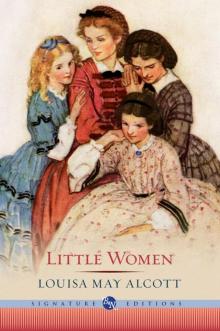 Little Women
Little Women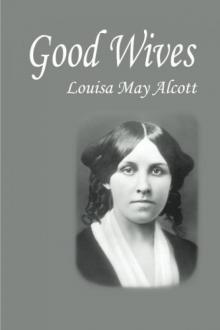 Good Wives
Good Wives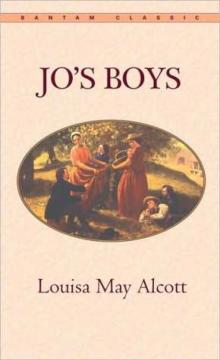 Jo's Boys
Jo's Boys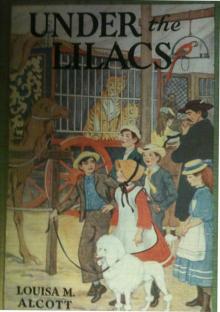 Under the Lilacs
Under the Lilacs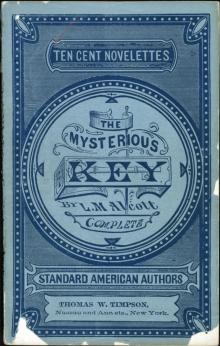 The Mysterious Key and What It Opened
The Mysterious Key and What It Opened The Inheritance
The Inheritance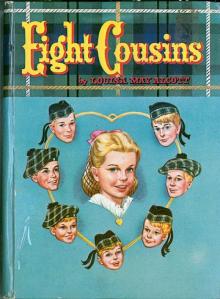 Eight Cousins
Eight Cousins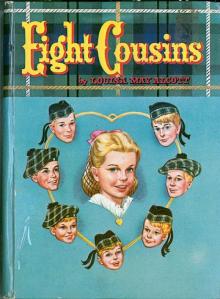 Eight Cousins; Or, The Aunt-Hill
Eight Cousins; Or, The Aunt-Hill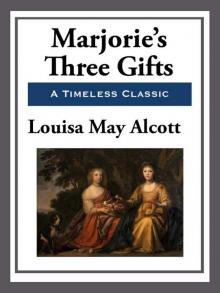 Marjorie's Three Gifts
Marjorie's Three Gifts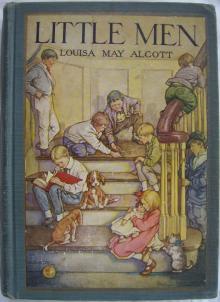 Little Men
Little Men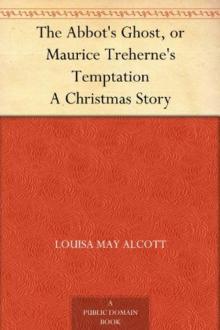 The Abbot's Ghost, or Maurice Treherne's Temptation: A Christmas Story
The Abbot's Ghost, or Maurice Treherne's Temptation: A Christmas Story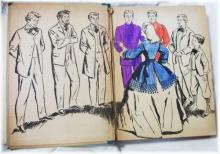 Rose in Bloom
Rose in Bloom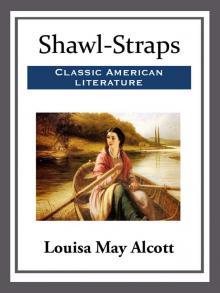 Shawl-Straps
Shawl-Straps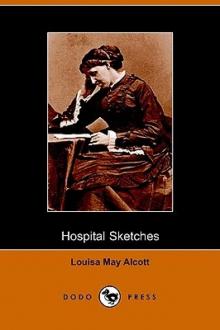 Hospital Sketches
Hospital Sketches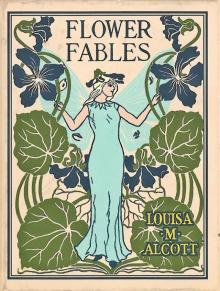 Flower Fables
Flower Fables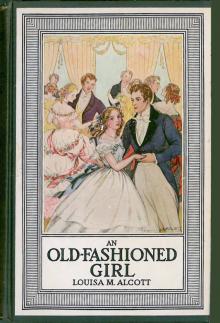 An Old-Fashioned Girl
An Old-Fashioned Girl The Candy Country
The Candy Country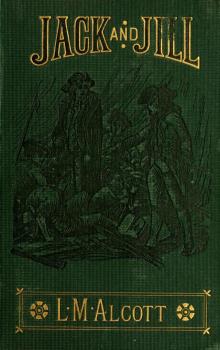 Jack and Jill
Jack and Jill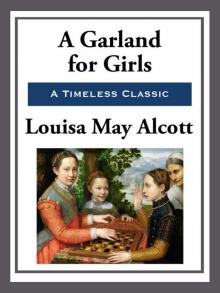 A Garland for Girls
A Garland for Girls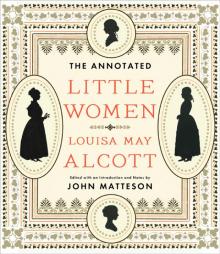 The Annotated Little Women
The Annotated Little Women A Classic Christmas
A Classic Christmas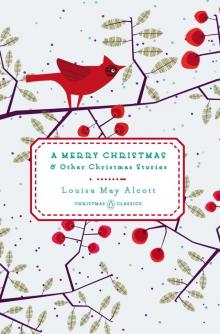 A Merry Christmas
A Merry Christmas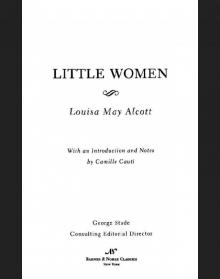 Little Women (Barnes & Noble Classics Series)
Little Women (Barnes & Noble Classics Series)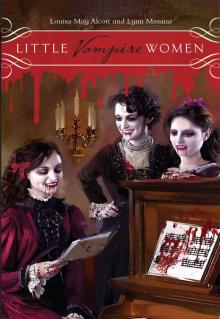 Little Vampire Women
Little Vampire Women